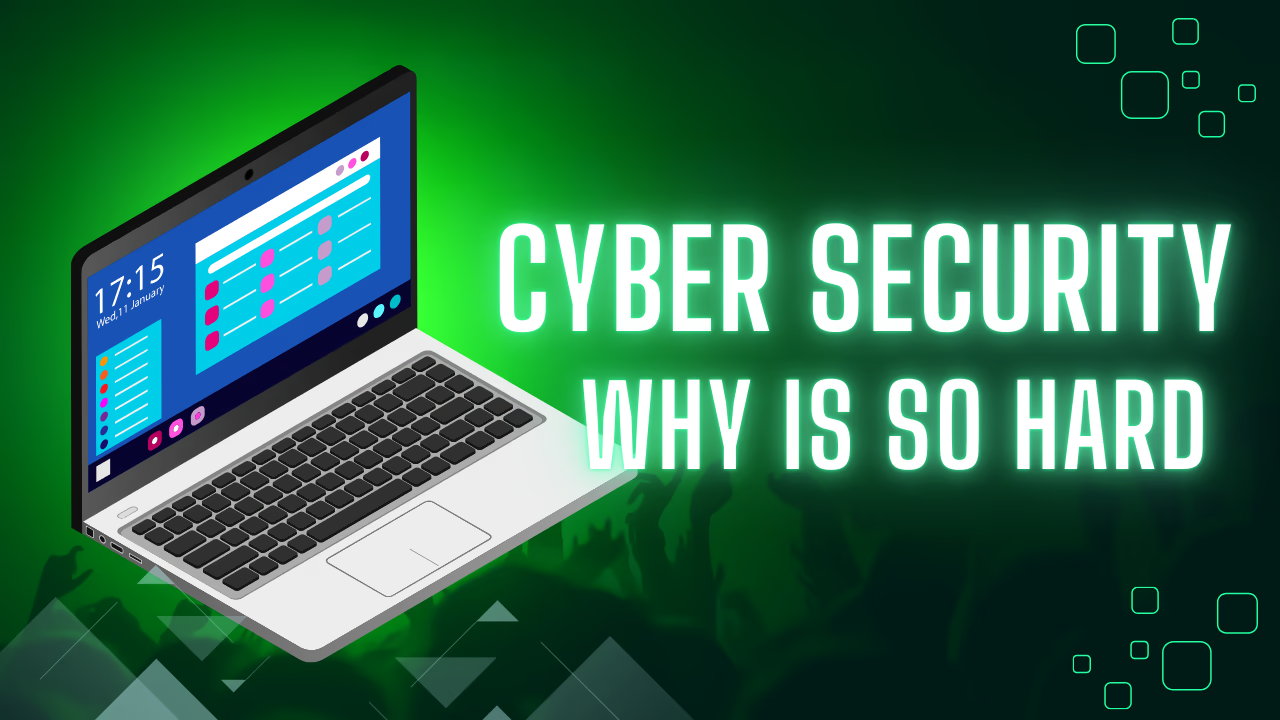Why is Cyber security So Hard? A Reality Check for Aspiring Professionals
In today’s digital world, the demand for cybersecurity professionals is skyrocketing. With growing cyber threats, many people dream of entering this lucrative field. However, despite its appeal, cybersecurity is not an easy career path. Some professionals even leave after working for a few years, frustrated by the challenges they face. So, why is cybersecurity so hard? Is it really that difficult to break into and grow within this field? In this article, we’ll break down the difficulties in cybersecurity and provide insights for those interested in pursuing a career in it.
The Complexity of Cyber security: Why Is It So Tough?
One of the main reasons cyber security is so challenging is because it’s vastly different from other fields, especially software development. In software development, you may only need to master a specific language or technology like JavaScript, React, or Python to stay relevant for years. But cybersecurity is much more dynamic.
In cybersecurity, you’re required to constantly learn and update your skills across various domains. For instance, you can’t just focus on mastering one tool or technology. You need to understand everything from network security, threat hunting, penetration testing, and cloud security to newer threats like ransomware and phishing. It’s this ever-changing landscape that makes cybersecurity so hard to master.
Job Challenges: Limited Availability and Work-Life Imbalance
A common complaint among professionals in the field is the lack of job opportunities and the high pressure once they land a job. Cybersecurity jobs often come with long hours, overtime, and a poor work-life balance. Many professionals feel they’re constantly on call, handling incidents or patching vulnerabilities at odd hours. Despite the high demand, getting a foothold in the industry as a fresher can be difficult because employers often seek experienced individuals.
Moreover, once you secure a job, it’s not uncommon to face slow career growth. Due to the field’s complexity and specialization, many professionals feel stuck in their roles with limited options for advancement. This leads to a lot of frustration and is one reason why some people choose to exit the cybersecurity industry.
The Importance of Self-Learning and Certifications
To succeed in cybersecurity, formal education alone is not enough. Many private institutions and online platforms offer specialized courses to help individuals gain industry-ready skills. One popular entry-level certification is the Certified Ethical Hacker (CEH), which covers the fundamentals of ethical hacking and cybersecurity. CEH courses typically include training on system hacking, web hacking, mobile hacking, IoT, and cloud security.
However, while certifications like CEH can make you job-ready, they aren’t a one-stop solution. Self-learning and staying updated on the latest trends are crucial for long-term success. The industry is filled with new threats and techniques, so you need to keep studying beyond your certifications.

Cybersecurity vs. Other Fields
When comparing cyber security to other fields like software development, you’ll notice some significant differences. In software development, learning a technology and becoming proficient in it might be enough to secure a job and maintain it for years. However, cybersecurity demands continuous learning across a wide variety of areas.
For instance, even if you’re focusing on a Red Teaming role (offensive security), you’ll need knowledge of Blue Team activities (defensive security) to fully understand the systems you’re testing. You need to be well-versed in everything from penetration testing, threat modeling, vulnerability management, and cloud security. Additionally, mastering tools like Metasploit or bypassing firewalls is essential for success in the role. It’s this vast scope that makes cyber security harder compared to other technical fields.
Why Do People Struggle to Enter Cybersecurity?
Many people ask, “I’ve worked in tech support or as a help desk agent for a few years. Can I transition into cybersecurity?” The short answer is yes, but it’s not that simple. You may have technical knowledge, but cybersecurity requires specialized skills. For example, knowing how to install operating systems or change hardware components won’t necessarily help you break into a cybersecurity role. You’ll need to learn specific cybersecurity practices, tools, and frameworks from scratch.
Additionally, the learning curve can feel overwhelming. Cyber security courses are often interrelated, and mastering one skill doesn’t guarantee you’ll pass an interview. For example, you might ace a Certified Ethical Hacker course, but still struggle in a job interview if you lack practical knowledge of industry-specific tools or techniques.
The Reality of Cybersecurity Interviews and Job Readiness
Even after completing courses and certifications, many candidates still find it tough to secure a job. Cyber security interviews are often challenging because they test your hands-on knowledge, analytical skills, and how well you stay updated with the latest threats. The hiring process is rigorous because companies want to ensure that the professionals they bring on board can handle real-time security challenges.
It’s important to take a balanced approach: study hard, practice real-world scenarios, and engage in self-learning. Participating in Capture the Flag (CTF) challenges, bug bounties, and hands-on labs can help you stay sharp and improve your chances in interviews.
Conclusion: Is Cybersecurity Hard? Yes, But It’s Worth It
So, is cyber security hard? Absolutely. The skill set required is vast, the jobs can be demanding, and the learning never stops. But if you’re passionate about protecting digital environments, this field offers immense growth and satisfaction.
If you’re considering a career in cybersecurity, be prepared for the hard work ahead. Take advantage of certifications, self-study, and hands-on practice to stand out in the competitive job market. Despite the challenges, cyber security is a rewarding field with plenty of opportunities for those willing to put in the effort.
FAQs
1. Is cyber security harder than software development?
Yes, cybersecurity can be more challenging because it requires continuous learning across multiple domains, while software development typically focuses on a specific technology or language.
2. Can beginners get into cybersecurity?
Yes, beginners can enter cybersecurity, but they need to pursue certifications like Certified Ethical Hacker (CEH) and continuously build practical skills.
3. How long does it take to learn cyber security?
It varies, but most people spend several months to a year gaining the basic skills through courses, certifications, and self-learning before landing an entry-level job.
4. What are the most in-demand skills in cyber security?
Some of the most in-demand skills include penetration testing, network security, cloud security, and threat intelligence
